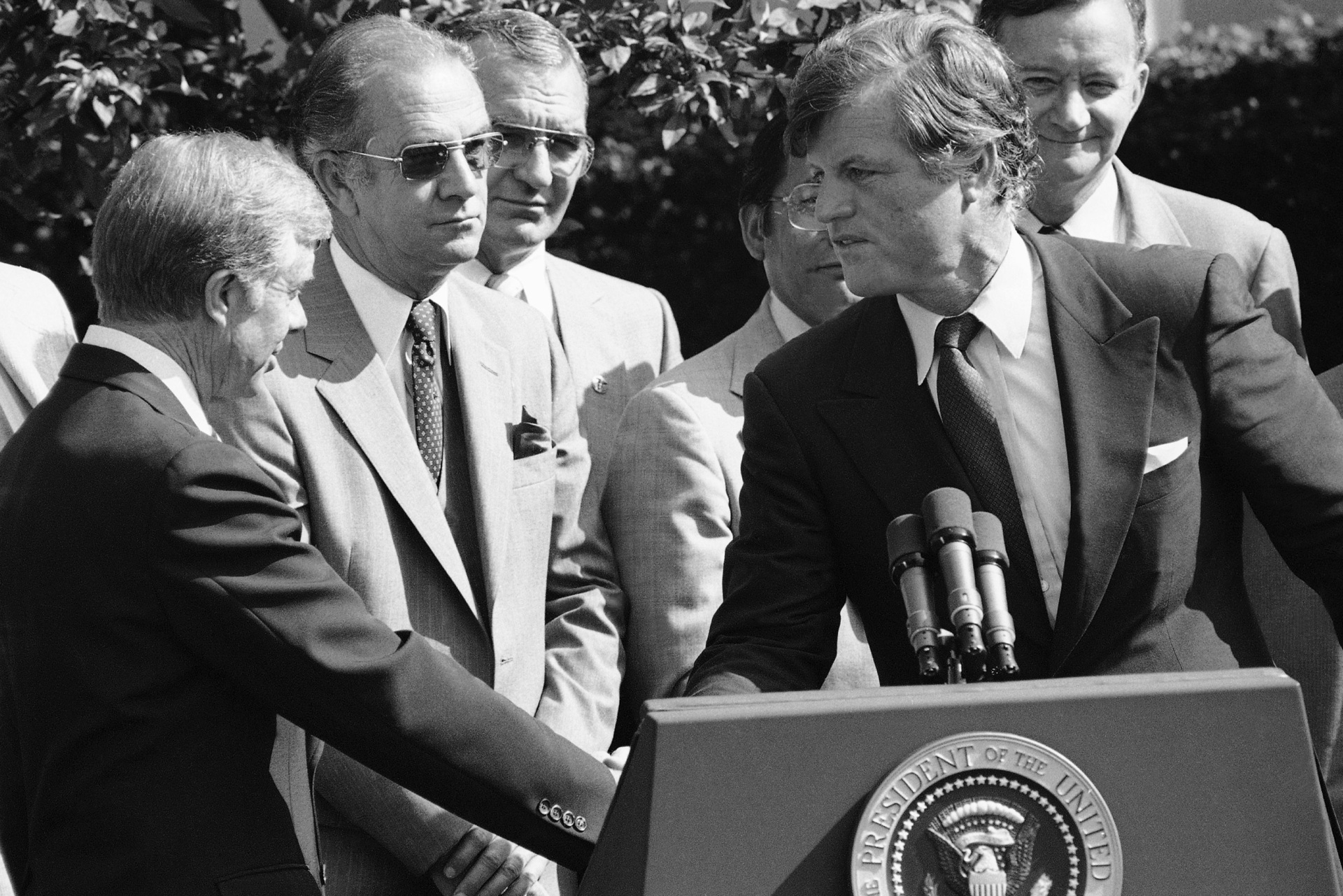
Dysfunction and Disjunction
Joe Biden, 46th president, is a weak Democratic incumbent. Five decades ago, Jimmy Carter, 39th president, was a weak Democratic incumbent. And now, both will be remembered for having been challenged for renomination by a Kennedy.
The similarities between Biden and Carter are striking. In fact, beginning on April 10, 2021, this author has written a total of 11 pieces for Breitbart News comparing them. The common theme is that Biden, like Carter before him, is suffering from disjunction, which is the poly sci term for a president whose coalition is coming unglued and who lacks the skills to glue it back together. Such disjunction leads to dysfunction. So, yes, Biden and Carter share many similarities: lame leadership, soft economy, rising inflation, worsening crime, and now a Kennedy on their six.
Back in 1979, Carter was challenged in the Democratic primaries by Massachusetts Sen. Edward Kennedy. Carter beat back Kennedy, although his fight to secure his renomination went all the way to the Democratic convention in August 1980. Three months later, Carter was defeated by Republican Ronald Reagan in a resounding landslide.

Presidential candidate Sen. Edward M. Kennedy (D-MA) shakes hands with President Jimmy Carter during a bill signing at the White House on July 1, 1980. (AP Photo)
So now, Biden finds himself challenged by another Kennedy, Robert F. Kennedy, Jr., nephew of Teddy and also President John F. Kennedy. As Mark Twain said, history doesn’t repeat itself, but it does rhyme. In this instance, it seems more than just a rhyme; it’s an epic saga of eternal return.
Just as Teddy Kennedy’s challenge to Carter came at a time of national “malaise,” now Bobby Kennedy, Jr.’s challenge to Biden comes at a time of national demoralization. According to an NBC News poll in January, 71 percent of Americans think the country is on the wrong track, with four in five believing that we’re either in a recession or about to be in one. So, it’s little wonder that Biden’s approval rating is a steady ten points underwater. And another poll found that 56 percent of Americans have doubts about Biden’s “fitness” for his job.
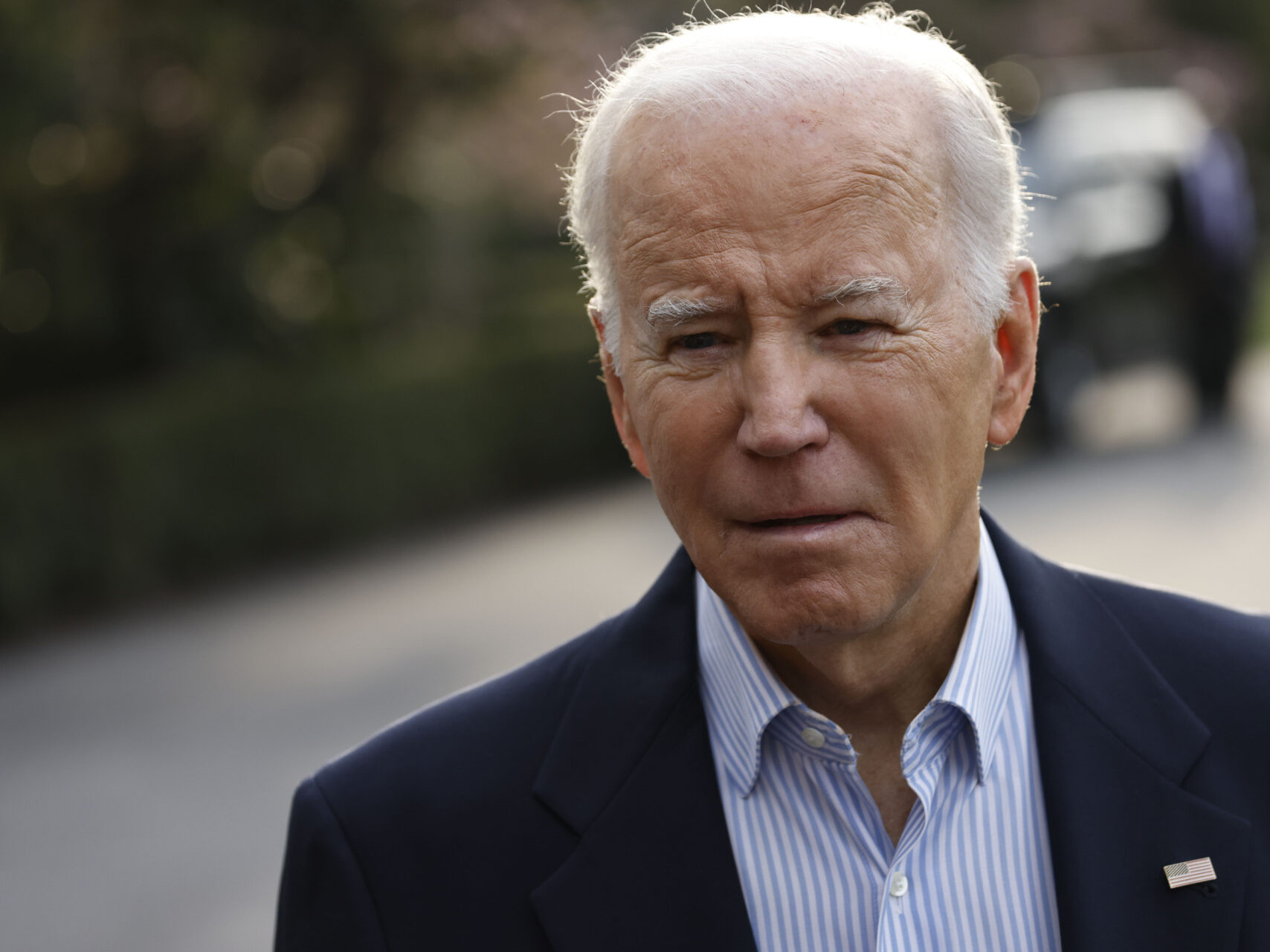
President Joe Biden speaks to the press at the White House on March 31, 2023. (Ting Shen/Bloomberg via Getty Images)
According to an April 19 poll, Kennedy already has the votes of 14 percent of those who say they voted for Biden in 2020. Just as interestingly, Biden has the backing of just 67 percent of those who voted for him; that’s soft support.
In fact, primary challenges against an incumbent president are never a good sign for the incumbent—or for the party trying to hold the White House. As we have seen, Teddy Kennedy’s challenge to Carter presaged the Democrats’ loss of the White House in 1980. In 1992, pundit Pat Buchanan challenged George H.W. Bush in the Republican primaries, giving the incumbent a scare in New Hampshire. Bush was renominated, but later lost badly to Democrat Bill Clinton.
Speaking of insurgencies, we might also recall Sen. Bernie Sanders in 2016; when Hillary Clinton was a sort of a president-in-waiting, the Vermont independent launched his “political revolution,” aiming directly at the Democratic establishment. Clinton lost that November, of course, to Donald Trump.
An American Revolutionary
So now, enter Bobby Jr. But his candidacy is much more than just a reflection of Biden’s weakness. He is, in fact, a serious thinker on issues, and his April 19 announcement speech proved it.
[embedded content]
He chose to launch his campaign in Boston, just a few miles from Lexington and Concord. It was on those fields and pastures, 248 years ago on April 19, that the America Revolution commenced. As Ralph Waldo Emerson lyricized, “The embattled farmers stood/ And fired the shot heard round the world.”
Kennedy, no stranger to the Irish tradition of evocative phrasing, offered his own quick take on the origins of the revolution: “The British had passed an oppressive law raising the taxes on tea,” the result of a deal that the “British crown made in collusion with the British East India Company.” And that provoked the Boston Tea Party. Then RFK Jr. added his own further take on what sparked the Revolution: “the corrupt merger of state and corporate power.”
In Kennedy’s telling, the history of the United States is the story of ongoing efforts to restrain abusive power, to keep government and private interests within the metes and bounds set by the Constitution. Even opponents of his candidacy will have a hard time arguing with that.
Indeed, Kennedy flails “the establishment” relentlessly, attacking crony capitalism, the military industrial complex, and hubristic imperialism of the type that led to the U.S. invasion of Iraq in 2003.
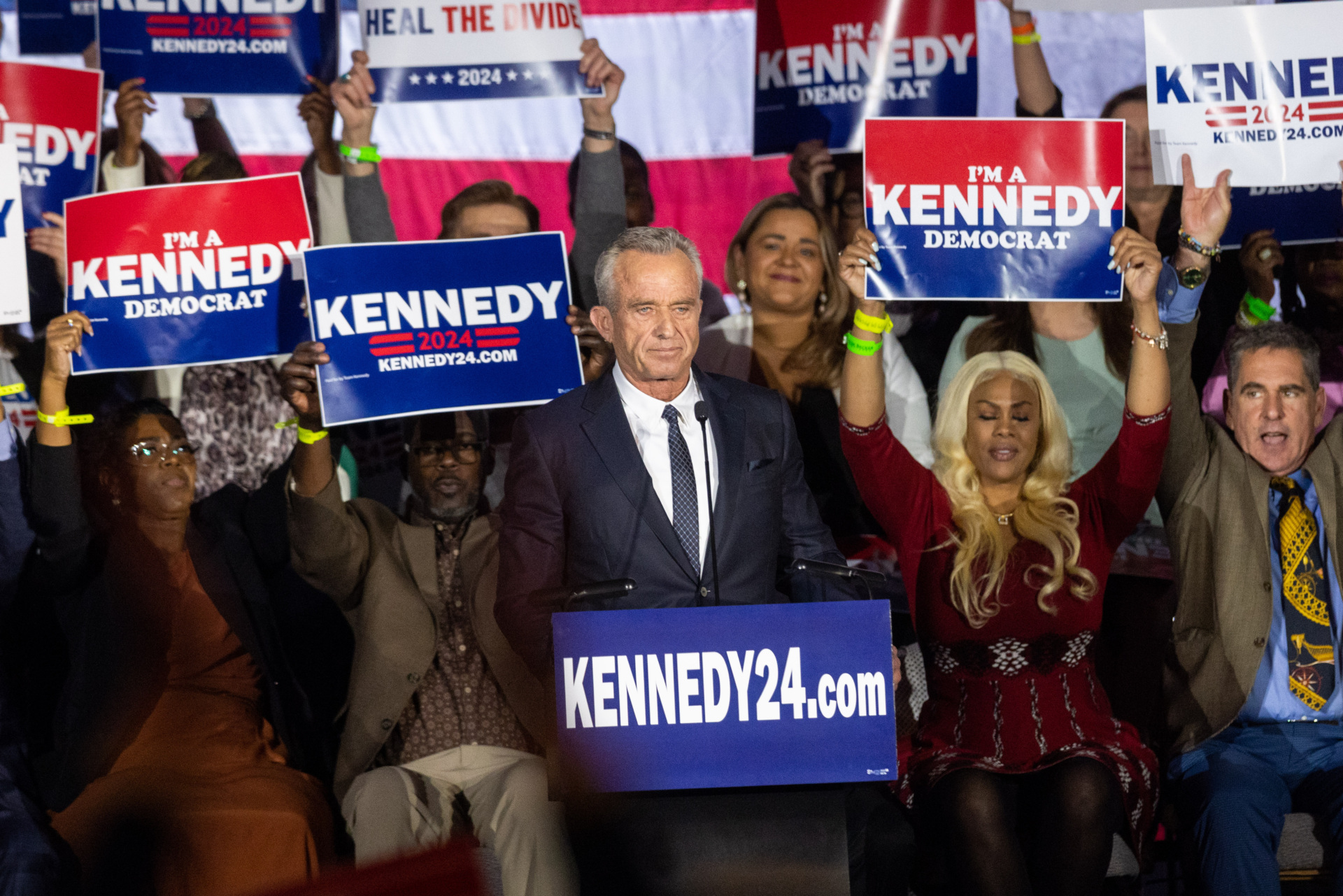
Robert F. Kennedy Jr. officially announces his candidacy for president on April 19, 2023, in Boston, MA. (Scott Eisen/Getty Images)
Here we can pause to note that while Kennedy inveighs against both parties, the fact that he is a Democrat means that his criticism of the Democratic Party cuts deeper, as when he jibed that his party must be more than just “neocons with woke bobbleheads.”
Still, Kennedy’s critique is completely bipartisan. He connected the intelligence failures of the 1962 Bay of Pigs invasion during his uncle’s administration with the subsequent much larger failure in Iraq during the Bush administration four decades later:
And in the middle of the Bay of Pigs, [JFK] realized they were lying to him, and he realized the function of the intelligence agencies had become to provide the military industrial complex with a constant pipeline of war. And he came out during the middle of the night during the Bay of Pigs catastrophe, and he said, I want to take the CIA… and shatter it into a thousand pieces and scatter it to the winds.
[…]
The neocons and CIA got to go into Iraq and do regime change. We spent $8 trillion and what did we get for it? Nothing . . . Iraq is now much worse off than it was when we went in there. We killed more Iraqis than Saddam Hussein ever did.
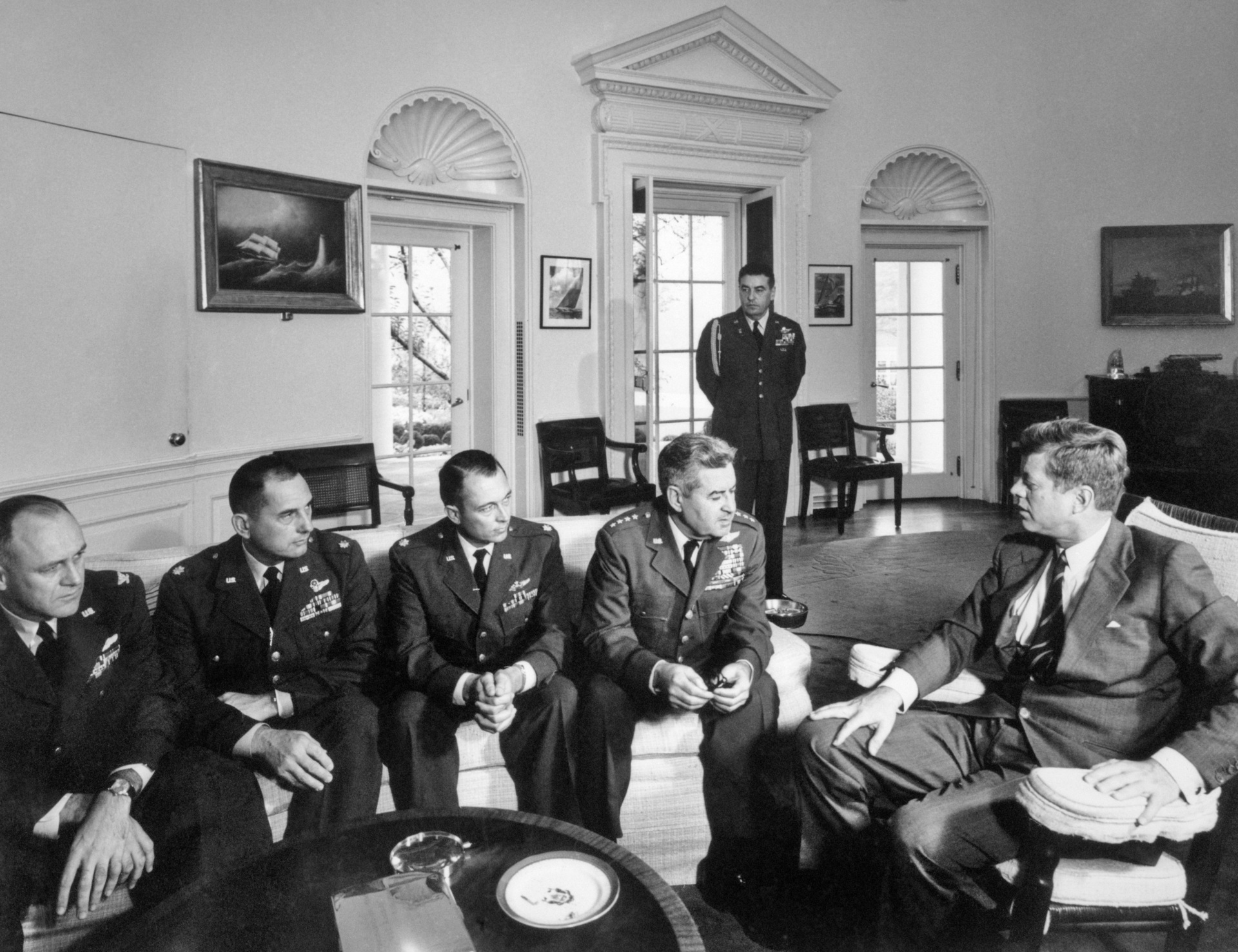
President John F. Kennedy meets with his generals during the Cuban Missile Crisis in October 1962. (Charles Phelps Cushing/ClassicStock/Getty Images)
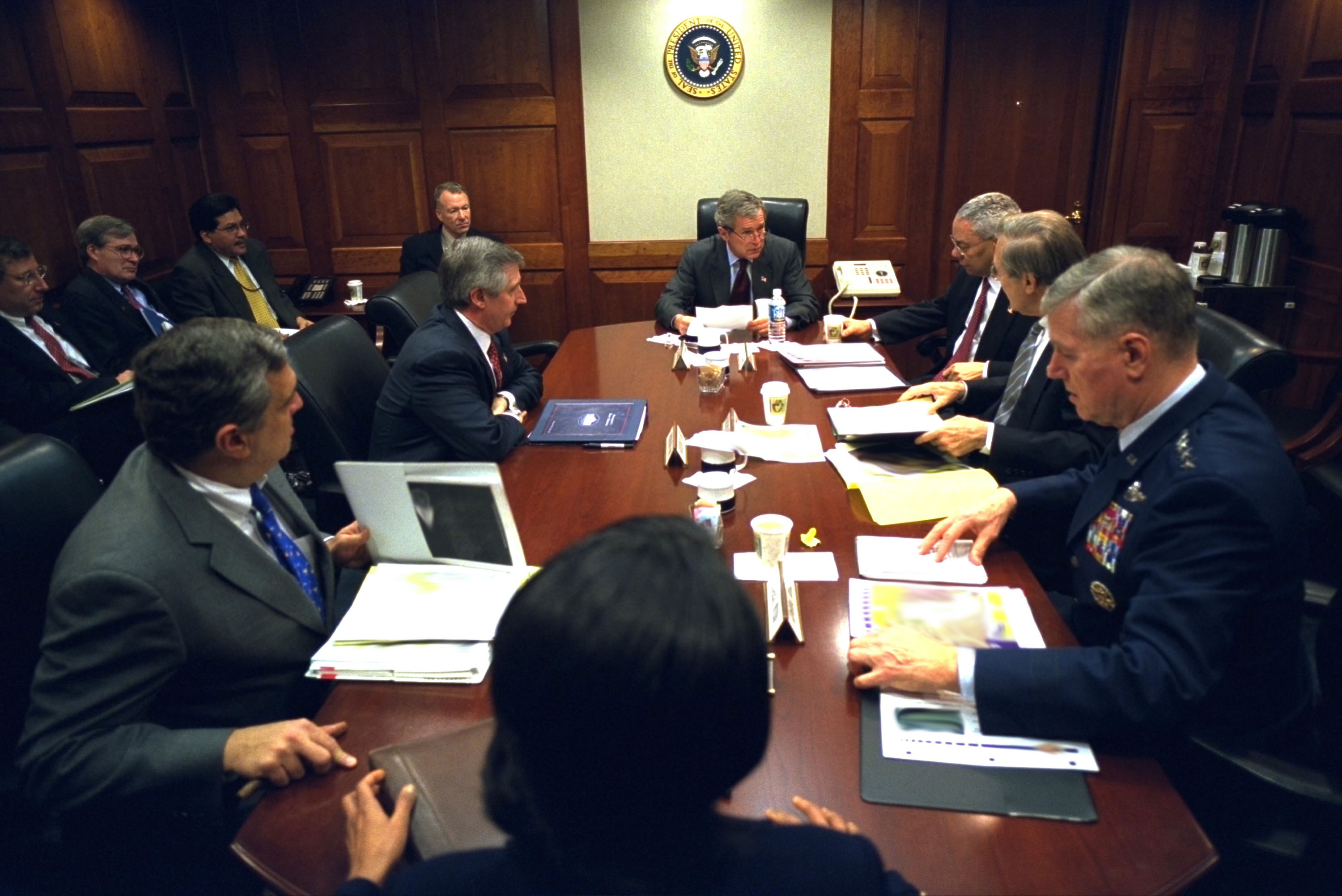
President George W. Bush meets with his war council in the White House Situation Room on March 21, 2003, at the onset of the Iraq War. (Eric Draper/White House/Getty Images)
Mindful of this history, Kennedy is nonetheless looking ahead; in his announcement he sounded the trumpet:
My mission over the next 18 months of this campaign and . . . throughout my presidency will be to end the corrupt merger of state and corporate power that has ruined the economy, shattered the middle class, polluted our landscapes and waters, poisoned our children, and robbed us of our values and freedoms.
Indeed, listening to him, it’s necessary to keep asking: Is he speaking as a liberal? Or as a conservative? When he cites a poll showing that only 22 percent of Americans trust their government and also only 22 percent trust the media, who is he hitting the hardest? And then he says:
We are going to take back this country. You give me a piece of ground and a sword and I’m going to take back this country with your help—the help of all the homeless Republicans and Democrats and Independents who are Americans first. [Emphasis added]
Gee, where have we heard that before? Indeed, on the night he announced, Kennedy appeared on Tucker Carlson’s show on Fox News. After hearing Kennedy’s attack on “corporate plutocracy,” Carlson said, “I agree with most of it.” Carlson’s words were not an endorsement of Kennedy’s candidacy, but they were an endorsement of Kennedy’s ideas, at least some of them.
Fighting the New Feudalism
The great challenge of our time, RFK Jr. maintains, is opposing those who are “threatening now to impose a new kind of corporate feudalism on our country. To commoditize our children … to poison our children and our people with chemicals and pharmaceutical drugs.”
His critique extends way-y-y beyond mere partisanship. For instance, we might recall his April 13 broadside tweet aimed at Microsoft mogul Bill Gates’ so-called “philanthrocapitalism,” which Kennedy describes as “a strategy of amplifying his billions by appearing to solve social problems with technologies that he controls and profits from.”
Indeed, RFK Jr. is not afraid to attack powerful targets. He has been relentless in his criticism of Anthony Fauci, Big Pharma, and Big Health. In his announcement speech, he showed genuine sophistication in explaining how government regulation actually works: “These regulatory agencies [have] become the sock puppets for the industry they were supposed to be regulating.”
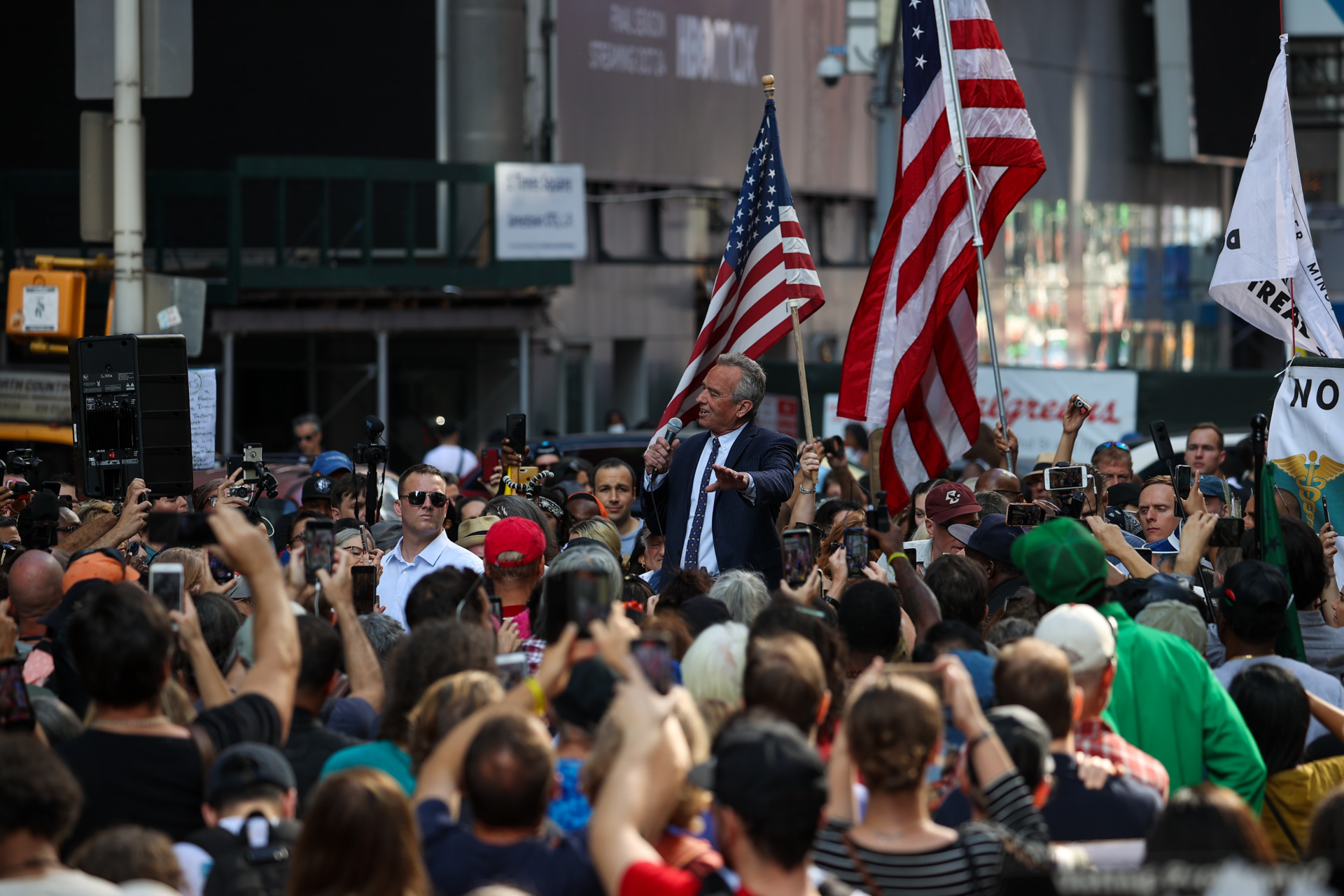
Robert F. Kennedy Jr. speaks at the Times Square protest against the COVID-19 vaccine mandate in New York City on October 16, 2021. (Tayfun Coskun/Anadolu Agency via Getty Images)

Robert F. Kennedy Jr. speaks at the “No Green Pass” protest against the COVID-19 vaccine mandate in Milan, Italy, on November 13, 2021. (Alessandro Bremec/NurPhoto via Getty Images)
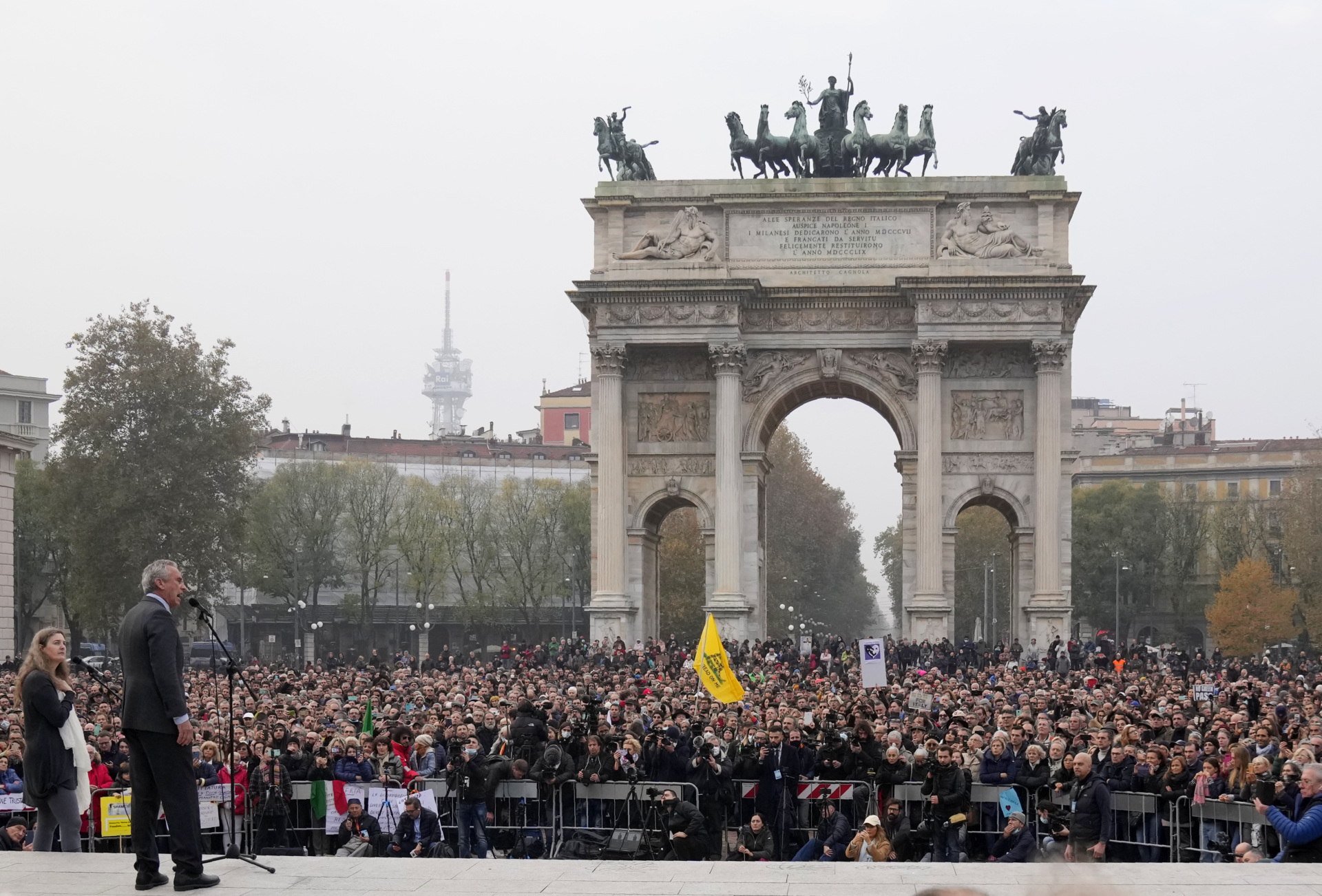
Robert F. Kennedy Jr. at the “No Green Pass” protest in Milan, Italy, on Nov. 13, 2021. (AP Photo/Antonio Calanni)
As to one aspect of Covid regulation, he was blunt: “The lockdown was the biggest shift in wealth in human history. We shifted $4 trillion from the middle class in this country to the super-rich. We created 500 new billionaires.” Speaking of one “old” billionaire, he had this to say about Jeff Bezos’ company: “Amazon closed down all of its competitors; 3.3 million business shut down.” He added, “I’m in a lawsuit involving Amazon, for censoring one of my books. They were censoring people who criticized the lockdowns while they were raking in money from the lockdowns.”
Yet in the meantime, the Biden administration is going full speed ahead with Covid policies Kennedy deplores. For instance, the Bidenites have launched a new $5 billion vaccine initiative, and they’re not even asking Congress—they’re using, they say, leftover Covid money, so they can just do it.
Probably most Republicans are suspicious of that kind of policymaking, and one suspects that many Democrats, too, will have concerns. Indeed, as we ponder RFK Jr.’s opposition to corporate-establishment policies wherever he sees them, we can begin to sense the dimensions of his political potential.
The Uniparty and the Horseshoe
Most Breitbart readers are familiar with the concepts of the “uniparty” (the elites of both parties in cahoots with each other) and the “horseshoe” (that while the working/middle class is currently divided into red vs. blue, regular folks have more in common with each other than with their respective party elites). Of these two concepts, it’s safe to say that the horseshoe is the less proven. It’s a theory and perhaps a dream, but it hasn’t been realized in electoral politics.
So, now comes RFK Jr. to take a run at it. In March, Kennedy appeared on comedian Jimmy Dore’s show. Dore is undeniably a left-winger; but in the rowdy spirit of of the horseshoe, he has a populist appeal and is also a frequent guest on Tucker Carlson’s Fox News show.
[embedded content]
When Dore called both parties “fascist” in their top-down cronyism, Kennedy agreed and lamented that big corporations were “censoring free speech…you can’t have a democracy without the free flow of information.” And on the plight of the people of train-wrecked East Palestine, Ohio, RFK Jr. sounded like populist Republican Ohio Sen. J.D. Vance.
Intriguingly, Dore and RFK Jr. then started talking about Donald Trump. Recalling Trump’s path to the 2016 Republican nomination, Kennedy said, “Trump was in the same position in the Republican Party that I am in the Democratic Party.” That is, party chiefs didn’t want him, but he led an “uprising” and won the nomination in spite of the bosses. “There is a template for how it might be possible,” Kennedy observed of his own nomination prospects. For his part, Dore was keen to pursue the Trump-Kennedy analogy; he headlined this interview clip: “RFK Jr. Says He Could Be The Donald Trump Of The Democratic Party.”
In fact, the Kennedy family has long found a way to appeal to Republicans and conservatives. Profiles in Courage, John F. Kennedy’s famous book from 1956, includes among its heroes Sen. Robert A. Taft, Republican of Ohio, who was the heart and soul of the conservative movement in mid-century. One can assign credit to JFK’s ghostwriter if one wishes, but the fact remains that it was Kennedy who had the instincts necessary to win the presidency in 1960. And who was JFK’s campaign manager? Why, that would be his brother, Robert F. Kennedy, Sr.
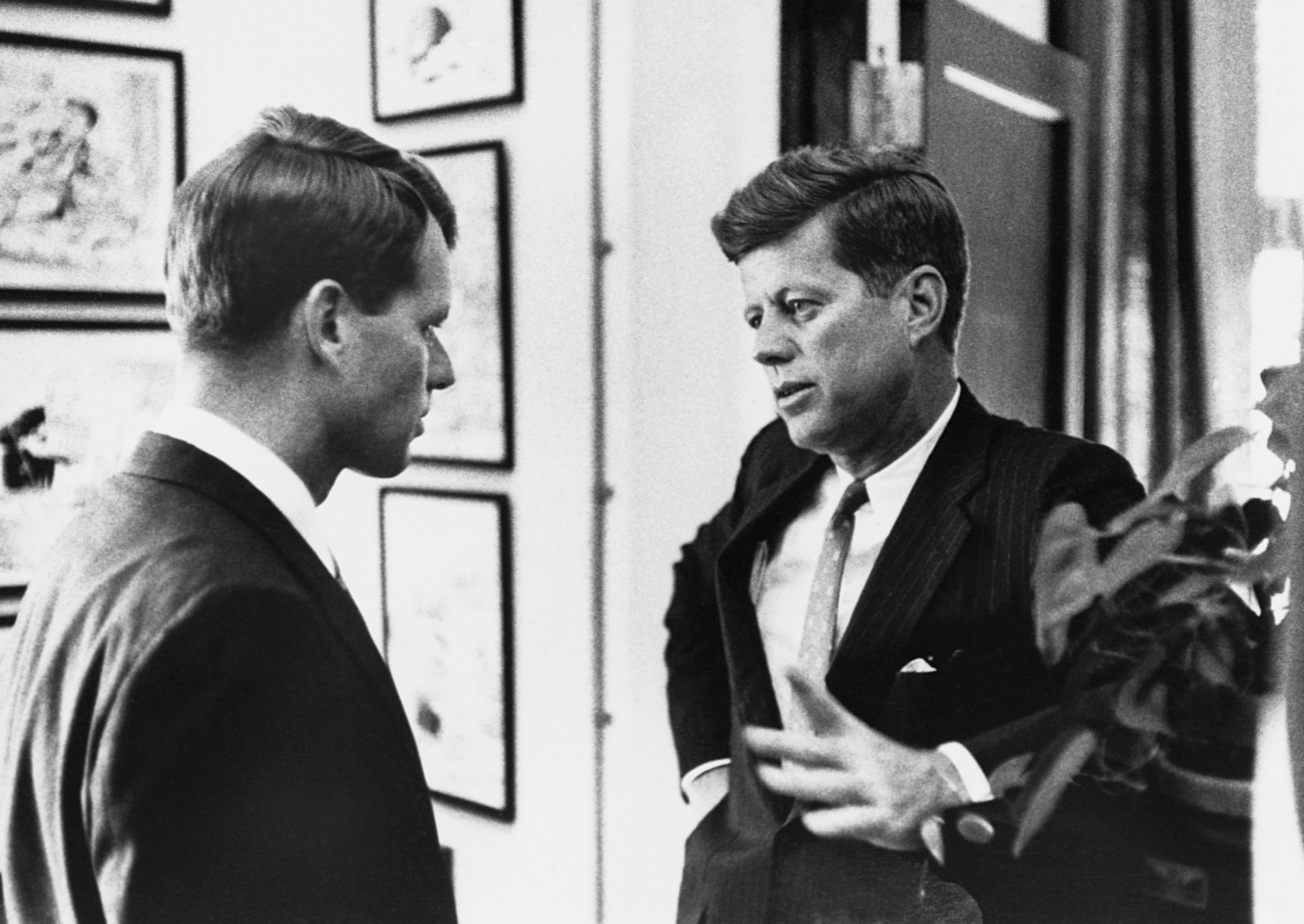
John F. Kennedy speaks with his brother Robert F. Kennedy on August 4, 1959. (Corbis via Getty Images)
For his part, Robert F. Kennedy, Jr. has had a textured political life. Back in 1974, he even made a nature documentary with Roger Ailes, then a prominent Republican operative; the two men, different as they were, stayed friendly until Ailes’ death in 2017.
Indeed, just on March 5, RFK Jr. spoke at Hillsdale College, the nation’s beacon of academic conservatism. Kennedy praised the school’s anti-Covid lockdown policy, calling Hillsdale “the only college that really stood up for freedom,” associating anti-lockdownism in the 21st century with anti-slavery abolitionism in the 19th century. He closed by saying:
I’ll leave you with three thoughts: 1. Any power that government takes from the people, it will never return voluntarily. 2. Every power that government takes, it will ultimately be abused to the maximum extent possible. 3. Nobody ever complied their way out of totalitarianism. The only thing we can do is resist.
Not everyone will agree with RFK Jr.’s way of thinking about things, but if 71 percent of Americans think the country is on the wrong track, then the newbie candidate might be mining some valuable ore.
Indeed, surveying RFK Jr.’s potential to disrupt everything, Breitbart News Senior Editor-at-Large Rebecca Mansour observed, “It’s no wonder they just want to call him ‘anti-vax’ and leave it at that.” That is, “they,” the uniparty, wish to put Kennedy in a box they have labeled “medical crackpot.” So, please voters, the uniparty is saying, pay no attention to the horseshoe-making potential of what else he has to say—even as a great many Americans agree with him about vaccinations and public health.
And he talks about these issues in a way that appeals to Americans broadly across party lines.
It’s no wonder they just want to call him “anti-vax” and leave it at that. 2/2
— Rebecca Mansour (@RAMansour) April 21, 2023
RFK Sr.’s Legacy
In his April 19 speech, RFK Jr. noted the similarities between his campaign and his father’s 1968 presidential campaign:
He was running against a president of his own party. He was running against a war… He was running at a time of unprecedented polarization in our country. And he had no chance of winning. My father, when he declared, had not a single molecule in him that believed that he could win the Democratic nomination.
But, he explained, his father’s “hopelessness” in his ability to win his party’s nomination “freed him to tell the truth to the American people.”
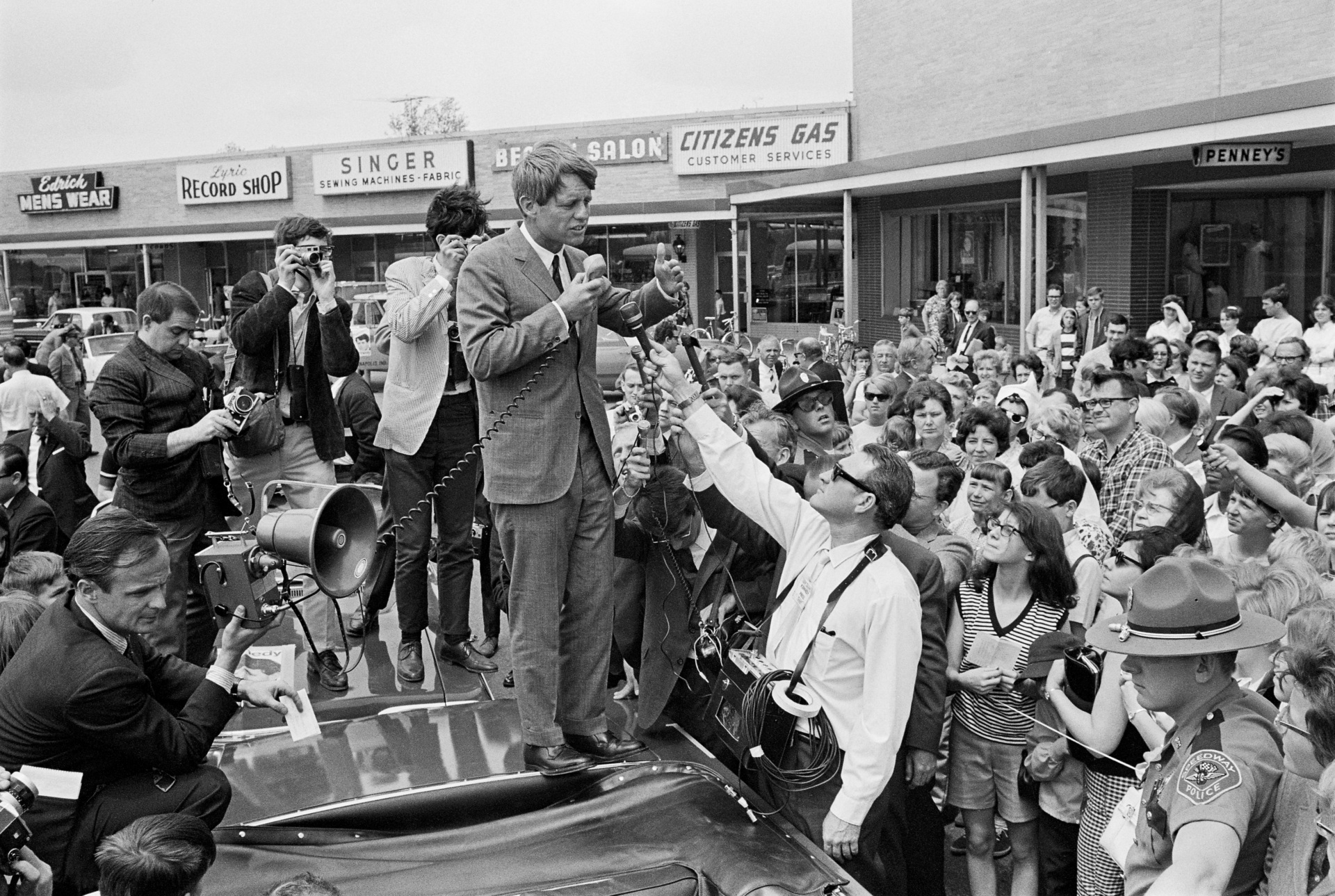
Democrat presidential candidate Bobby Kennedy speaks to a crowd of his supporters during a campaign stop in 1968. (Wally McNamee/CORBIS/Corbis via Getty Images)
Robert F. Kennedy, Sr. is remembered today as a liberal. He was a pro-civil rights attorney general in his brother’s administration and then a Democratic senator from New York. However, the half-century career of the late Massachusetts Senator Teddy Kennedy—who was for sure a leftist—has tinctured the legacy of his elder brother.
What’s often lost about RFK Sr. is that he had a vision of uniting working class Americans and transcending regional and racial divides: what today we could call the horseshoe. That unifying goal was a major theme of his long-shot 1968 campaign, which, as RFK Jr. notes, was not favored by his party’s establishment.
Whether or not he could have succeeded is open to debate, as it’s a permanent unknown. Robert F. Kennedy, Sr. was assassinated on June 6, 1968, just after winning the California and South Dakota primaries.
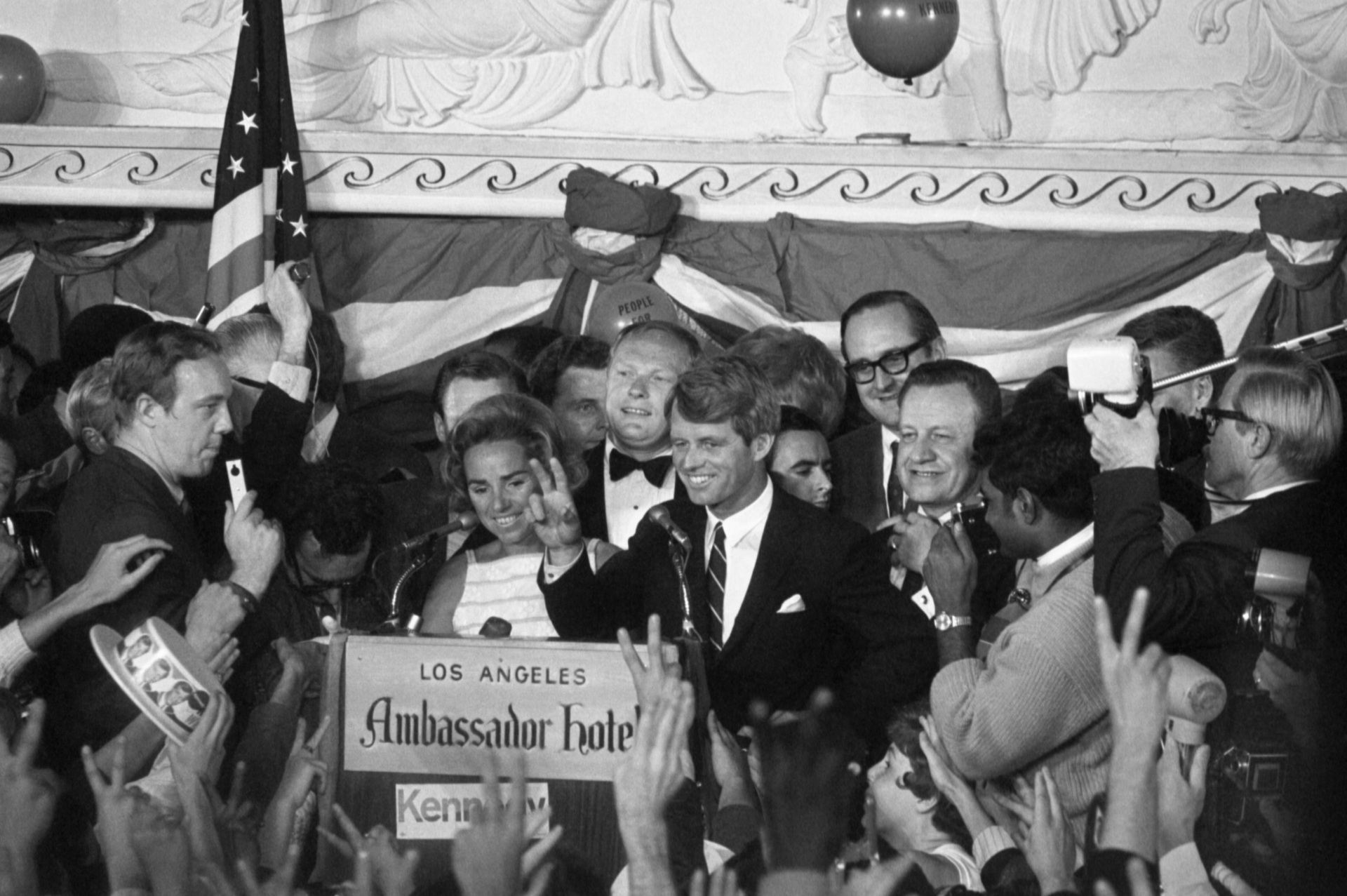
Sen. Robert F. Kennedy, with his wife Ethel next to him, gives the victory sign to the crowd at the Ambassador Hotel in Los Angeles, CA, on June 6, after winning the California primary. A few minutes later, he was killed by an assassin’s bullet. (Getty Images)
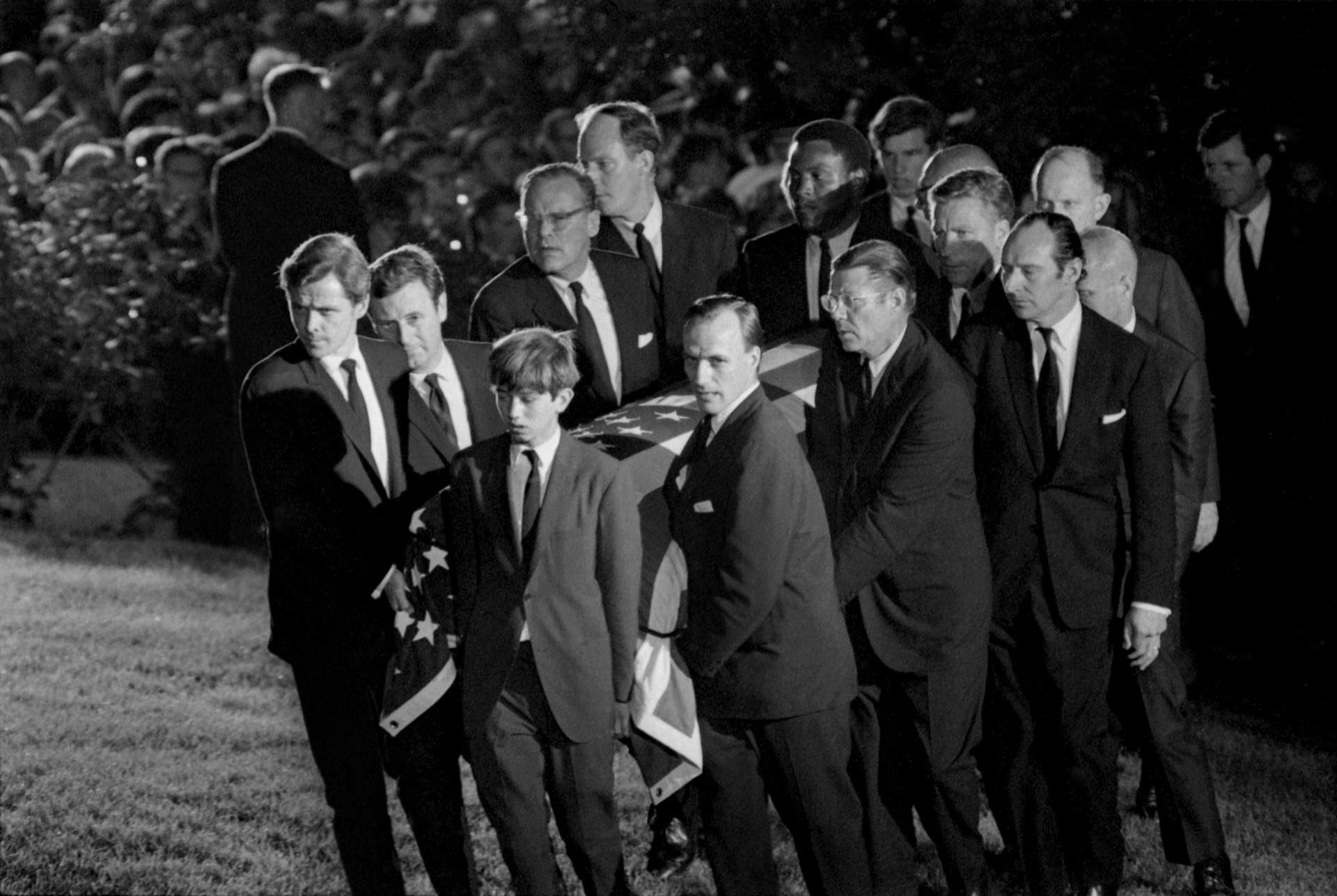
Pallbearers (including Robert F. Kennedy Jr., John Glenn, Douglas Dillon, LeMoyne Billings, Lord Harlech, James Whittaker, Steven Smith, David Hackett, Robert S. McNamara, and Rafer Johnson) carry the coffin of Sen. Robert F. Kennedy to his grave site at Arlington National Cemetery on June 9, 1968. (Michael Ochs Archives/Getty Images)
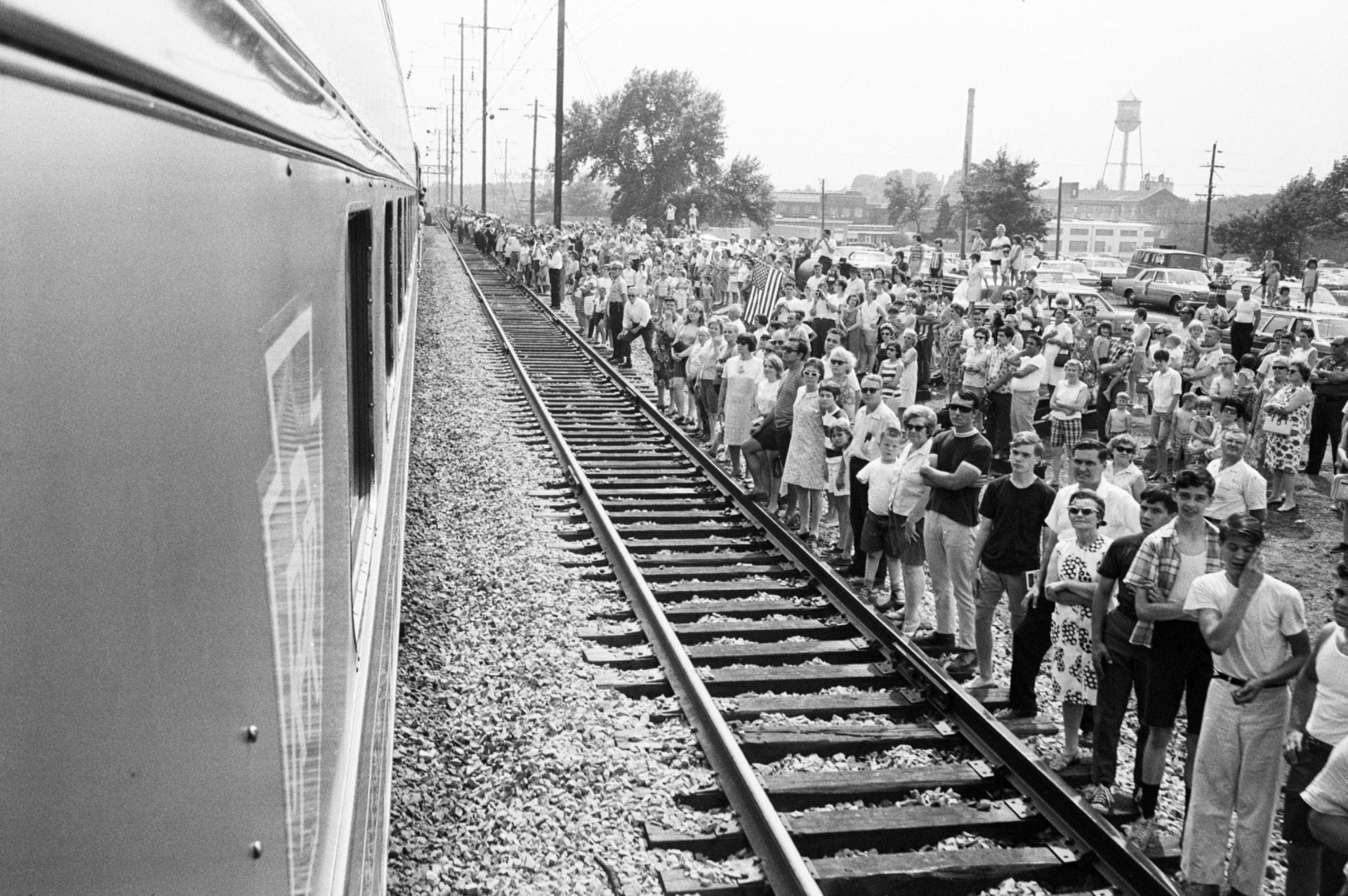
Crowds of people line the railroad tracks as the funeral train carrying the body of Sen. Robert F. Kennedy from NYC to Washington, DC, passes by on June 8, 1968. (Getty Images)
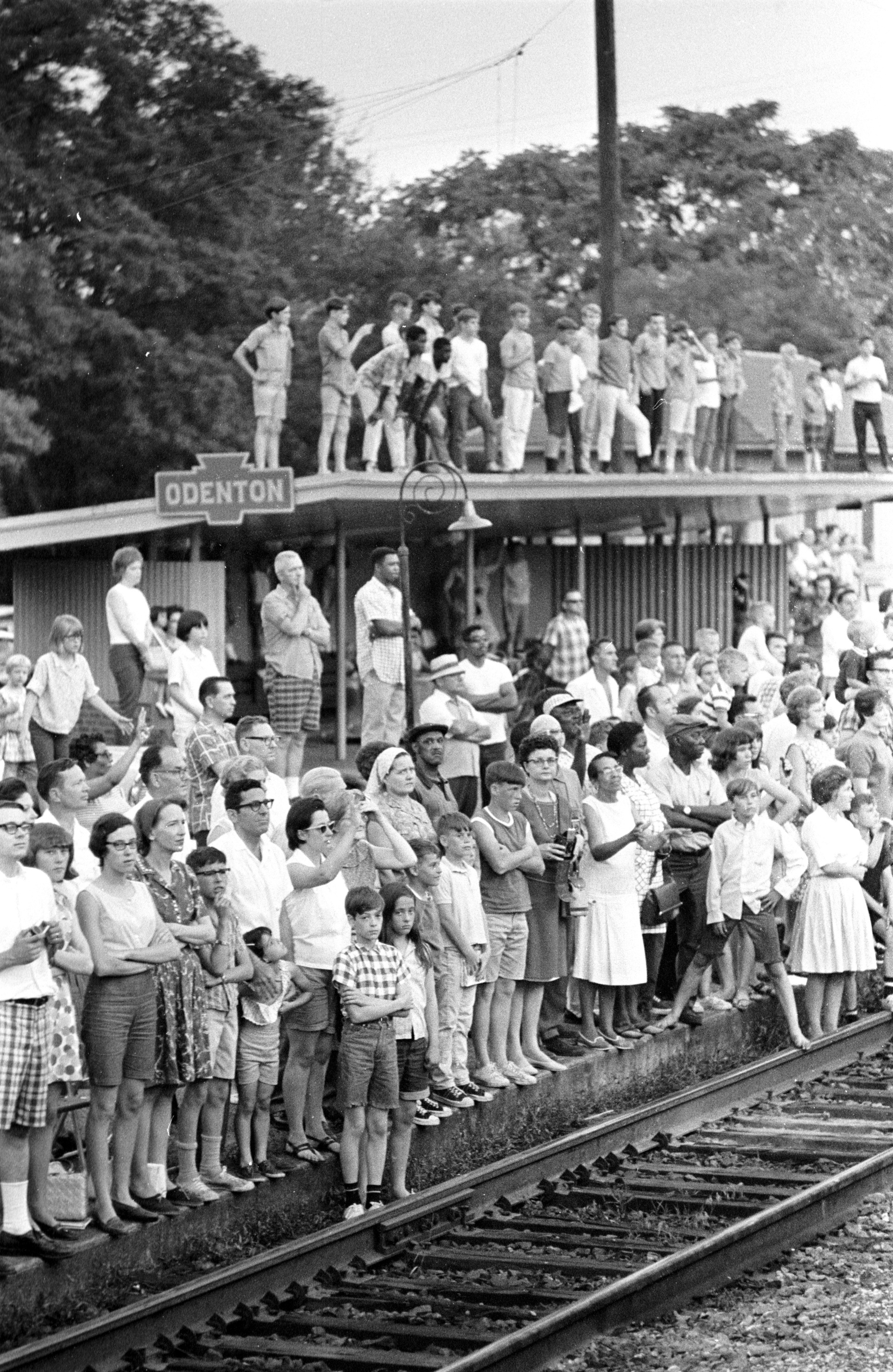
(Steve Northrup/The Washington Post via Getty Images)
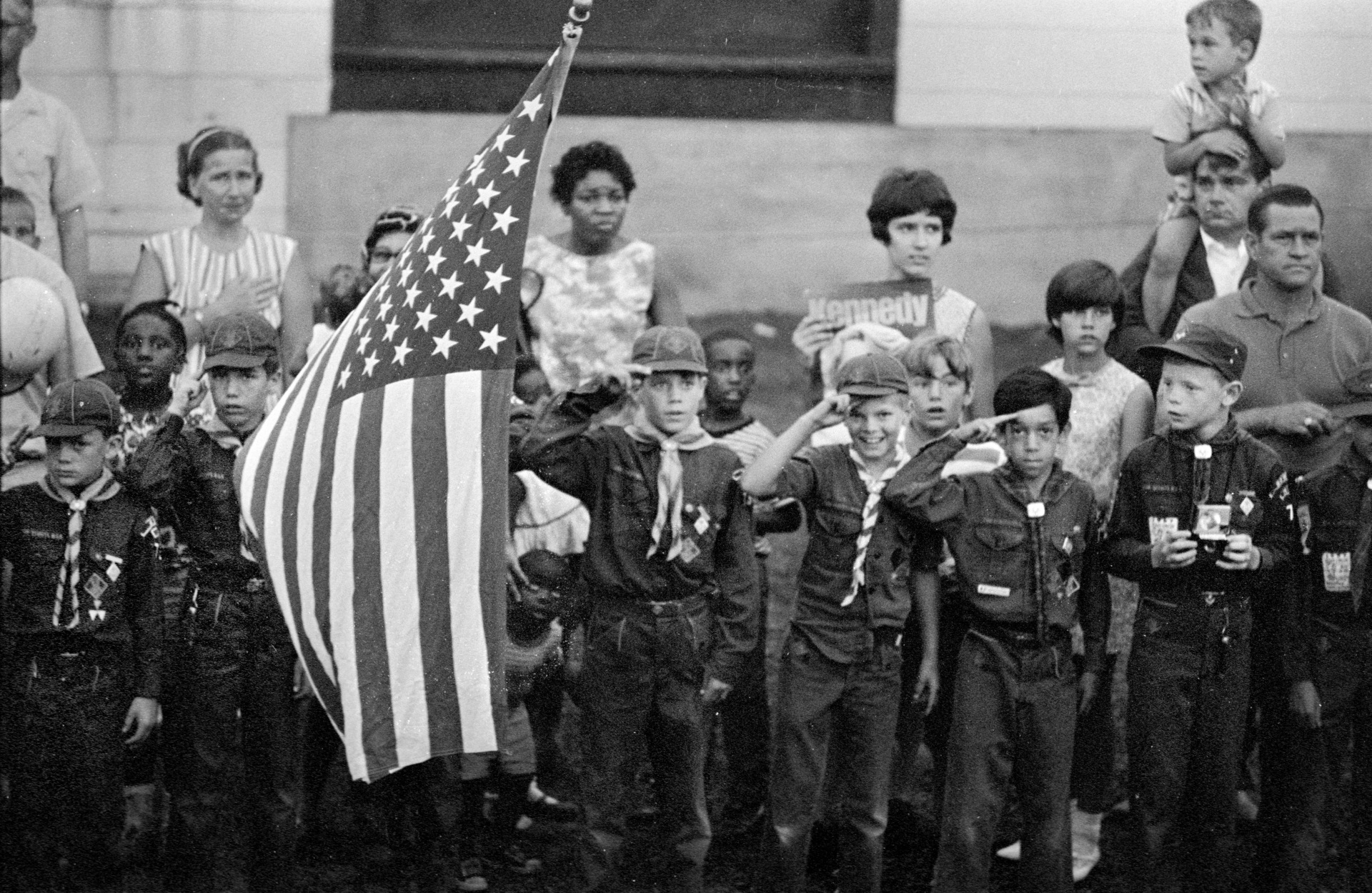
(Steve Northrup/The Washington Post via Getty Images)
For his part, RFK Jr. has no doubts about what his father could have accomplished had he lived. As the younger Kennedy said of his martyred father, “On the day he died, he won the California primary, the most urban state in the country, and the same day the South Dakota primary, the most rural. He had succeed in uniting America and building the bridge just by telling the truth.”
Once again, we’ll never know if the elder Kennedy could have done it; 1968 was, after all, a good year for Republicans, with Richard Nixon winning the White House. And today, we don’t know if the younger Kennedy can do it. He has Biden in the way, he has Republicans in the way, and he himself is untested as a candidate, let alone as an office-holder.
Yet we do know this much: At a time when nearly three-fourths of Americans think the nation is on the wrong track, an anti-establishment message is going to resonate. Maybe it’s not just the Biden administration that’s disjunctive and thus dysfunctional; maybe that’s the problem with the entire elite, the whole of the ruling class.
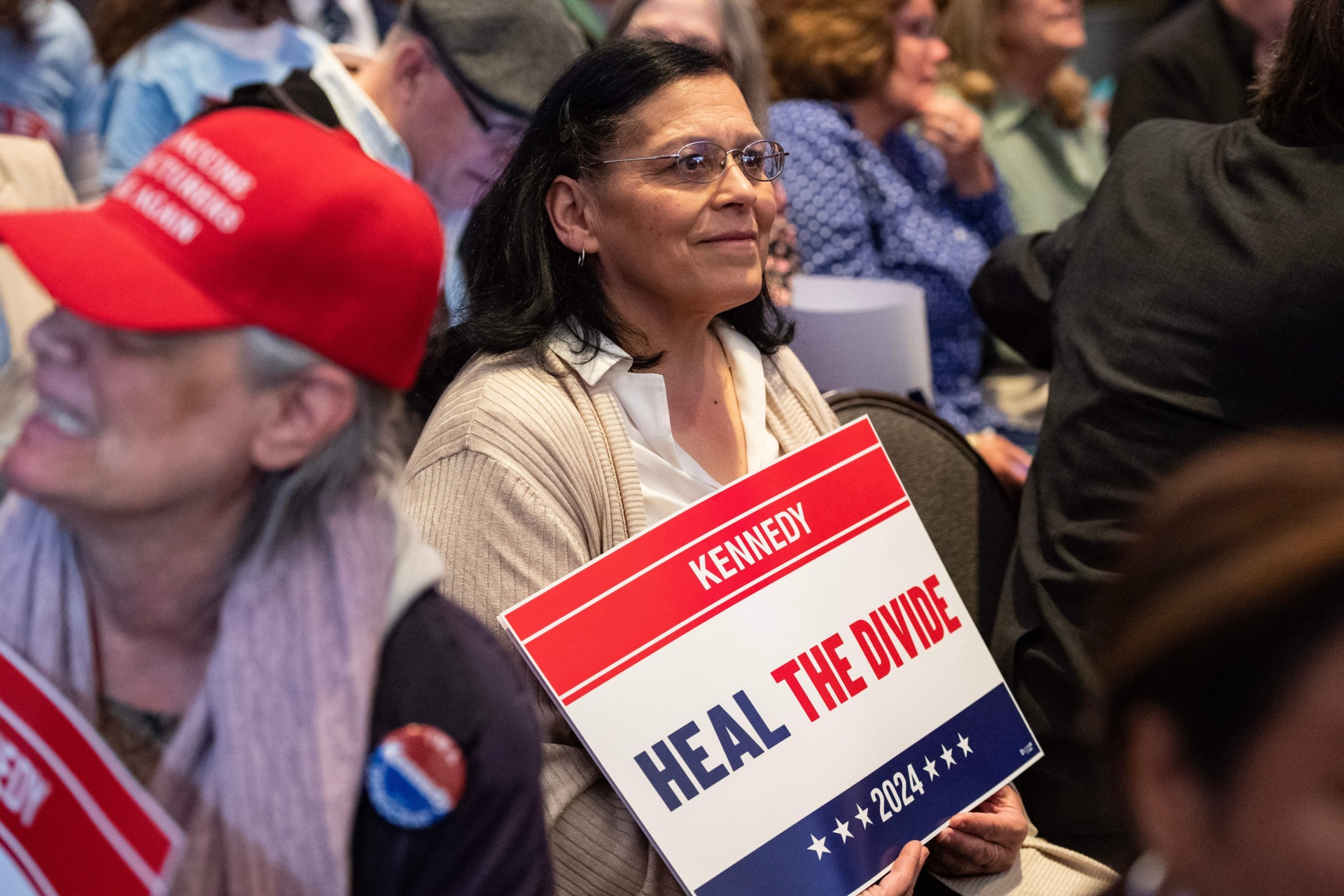
Supporters of Robert F. Kennedy, Jr., await his 2024 presidential bid announcement in Boston, MA, on April 19, 2023. (JOSEPH PREZIOSO/AFP via Getty Images)
So, does that open the path for an anti-establishment candidate? Perhaps. Indeed, it’s even possible that an anti-establishmentarian will pull together that horseshoe of a red-blue coalition. The nearly three-fourths of Americans who think things are going wrong is a good place to start horseshoe-making. Still, it will take that much voting mojo at the bottom to overturn the money and media power at the top.
But the establishment didn’t get established for no reason; it is hardly without resources in its own defense. Mindful of defending its own power, the uniparty has worked to keep potential opposition from combining, thus keeping the horseshoe from forming.
Indeed, in light of tragic history, a grim thought about a horseshoe-making, establishment-threatening message is that the messenger could be at no small risk.




